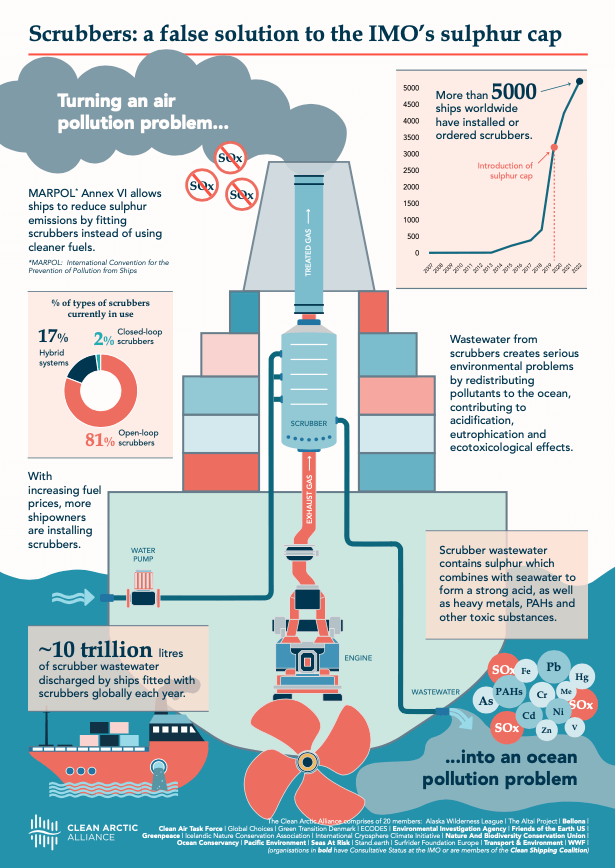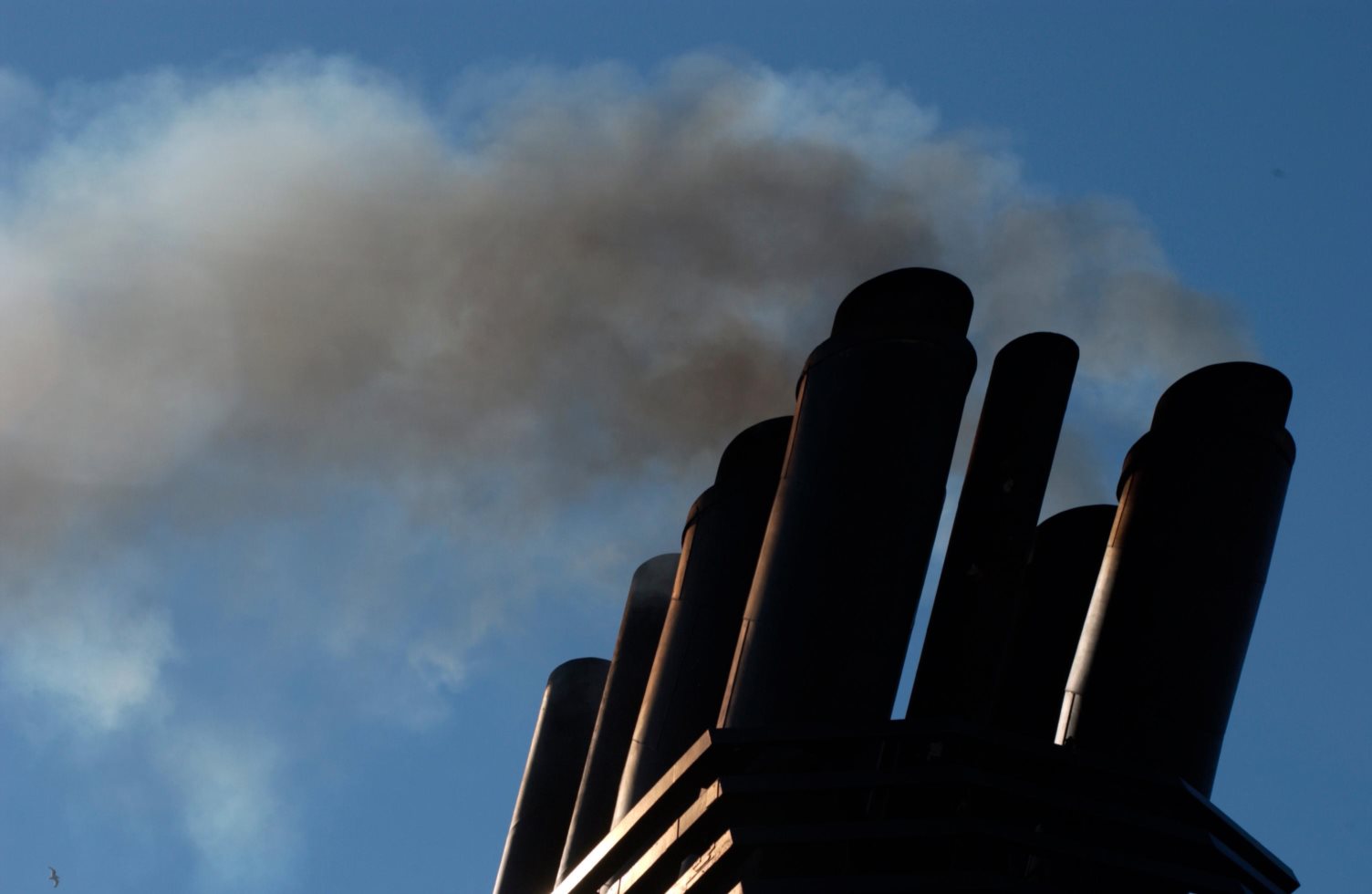Infographic: Scrubbers: a false solution to the IMO’s Sulphur Cap
It has been reported in the last year that the removal of sulphur from ship fuels has led to global heating and a significant increase in ocean temperature (Carbon Brief). The recent paper, published in Nature the end of May “Abrupt reduction in shipping emission as an inadvertent geoengineering termination shock produces substantial radiative warming”, argues that the introduction of an International Maritime Organization (IMO) regulation reducing the allowable levels of sulphur in ships fuels from 3.5% to 0.5% from 1 January 2020 – the so-called “sulphur cap” has created an “inadvertent geoengineering termination shock with global impact”. The findings of this paper have, however, been countered by other scientists, many of who claim that there is more to what is happening with the high ocean temperatures than can be accounted for by this latest work and the removal of the cooling effect of sulphur emissions.
What is SOx? SOx or sulphur oxide is used to refer to a range of sulphur and oxygen compounds, including sulphur monoxide (SO), sulphur dioxide (SO2), sulphur trioxide (SO3), disulphur monoxide (S20), etc. Exposure to SOx leads to health problems particularly asthma and bronchitis and is recognised to have been a contributory factor in thousands of respiratory-related deaths (UK Government). SO2 is a corrosive, acidic gas produced through the burning of coal and crude or refined heavy fuel oils. SO2 can combine with nitrogen oxide and ammonia to form particulate matter (PM) which also has consequences for health. SOx can also combine with water vapour in the atmosphere and form acid rain leading to significant damage to ecosystems. Restrictions on the use of high sulphur fuels in power stations and land-based transport by many countries has resulted in vastly reduced SOx emissions into the atmosphere in recent decades.
Atmospheric aerosols which include SOx as well as inorganic carbon and black carbon, are produced by a variety of sources and different ways. They include a variety of chemical compositions and vary in size. Primary aerosols or combustion aerosols, such as inorganic carbon and black carbon, are emitted directly into the atmosphere from burning of organic matter. While secondary aerosols form in the atmosphere in an association between precursor gases, water vapour and particles. The main components are sulphate, nitrate and organic carbon. In the atmosphere, all atmospheric aerosols scatter solar radiation, and some also absorb incoming solar radiation – of which black carbon is the most important. Sulphate aerosols from various sources including the combustion of fossil fuels, has a cooling effect on the atmosphere (Nature) because this pollution is associated with cloud formation and heat is reflected back into space. Aerosols such as black carbon which absorbs solar radiation as well as scattering it, has a warming effect. In addition, black carbon when it settles onto snow and ice in polar or glacier regions has a further impact speeding up the melting of snow and ice and revealing darker, heat absorbing surfaces below the snow and ice. As measures have stepped up to reduce air pollution especially in Europe, North America and in parts of Asia, the masking of global warming has lessened (Yale 360). Some analysis suggests that reducing the sulphur content of fuels and subsequently SOx emissions from transport including international shipping has contributed to this unmasking (Carbon Brief).
Since 2005, the International Convention for the Prevention of Pollution from Ships (MARPOL) has regulated shipping air pollution emissions including emissions of SOx. The IMO implemented the latest measures to reduce the sulphur content of marine fuels and thus SOx/PM emissions in 2020, in order to reduce, significantly, the seriously adverse impacts on human health – respiratory, cardiovascular and lung disease – and the environment – including acid rain and acidification of the oceans. It was estimated that more than 60,000 premature deaths were caused by air pollution from ships each year (New Scientist). When the agreement on the sulphur cap was reached the estimate was c. 250,000 premature deaths avoided and c. 50 million childhood asthma cases annually, mostly in the developing world (Nature).
In doing so, this unmasking phenomenon was understood and taken into consideration. Priority was accorded to global action to reduce premature deaths, protect the health of populations especially in coastal areas and address issues such as acid rain (IMO). Many had anticipated that moving away from high sulphur residual fuels would result in a switch to cleaner fuels such as distillate would result in parallel reductions in greenhouse gases and particularly in the potent climate forcing pollutant, black carbon (Nature). Reductions in emissions of black carbon – could have in some part countered the increased warming due to reduced SOx emissions. Somewhat frustratingly this didn’t happen as the new blended fuels were introduced which meet the required limits for sulphur content, but which do not significantly reduce the amounts of black carbon being emitted.
It is not a question of human health versus the climate. Both these existential issues for mankind need to be urgently addressed. So we need to recognise that the loss of cooling from sulphate aerosols means that IMO Member States and industry must now double down and urgently accelerate efforts to cut emissions of CO2 and short lived climate forcers, such as black carbon and methane from global shipping which are contributing to global heating.
The IMO is not going to reverse its decision to reduce air pollution from shipping by lowering the sulphur content of oil-based fuels. MARPOL Annex VI has included regulations to reduce sulphur emissions from shippings in a stepped process since it came into effect in 2005. The regulation to reduce the sulphur content of fuel oils to 0.5% in 2020 included a clause allowing a possible delay to 2025. A decision was taken some years before the entry into force date of 2020 to not make use of the delay clause and fuel compositions have changed as a consequence (IMO). The IMO identifies a number of benefits resulting from the change including cleaner air, positive impacts on human health, higher quality fuels, and adaptation of ship operators, owners and refineries. Some high sulphur fuels are still used today but due to regulations can only be used with a scrubber to remove the SOx, which in turn leads to further pollution problems with large volumes of scrubber effluent being discharged into the sea – turning an air pollution problem into an ocean pollution problem (Clean Arctic Alliance).
Furthermore, it is very unlikely that reduced SOx emissions from ships are solely responsible for the dramatic increase in sea temperatures seen globally. There are numerous factors that likely have a role too, including the absorption of more than 90% of all excess heat energy trapped by CO2 by the oceans since the 1970s, the weakening of Atlantic wind systems, lower Saharan dust in the atmosphere, and importantly the El Nino / El Nina cycle (Carbon Brief, Nature).
What must happen now however is that we must urgently reduce our reliance on fossil fuels and rapidly decarbonise the shipping sector. This is essential to reduce shipping’s climate impact. In particular, urgent action to reduce black carbon emissions from ships by requiring the use of cleaner fuels by those operating above 60oN latitude, but even those above 40oN latitude and installing diesel particulate filters or similar technology to reduce black carbon emissions by over 90% would not only limit the loss of the polar albedo effect but also help counter any increase in warming resulting from improvements which reduce air pollution.
Pollution can never be part of the solution to the over-heating of the planet.
About the Clean Arctic Alliance
Made up of 23 not-for-profit organisations, the Clean Arctic Alliance campaigns to persuade governments to take action to protect the Arctic, its wildlife and its people.
Members include: Alaska Wilderness League, Bellona, Clean Air Task Force, Ecology and Development Foundation ECODES, Environmental Investigation Agency, Equal Routes, Eurasian Wildlife and Peoples, Friends of the Earth US, Global Choices, Green Global Future, Green Transition Denmark, Greenpeace, Iceland Nature Conservation Association, International Cryosphere Climate Initiative, Nature And Biodiversity Conservation Union, Ocean Conservancy, Pacific Environment, Seas At Risk, Surfrider Foundation Europe, Stand.Earth, Transport & Environment, WWF and Zero.
More more information visit https://www.cleanarctic.org/




